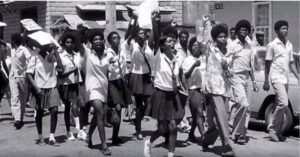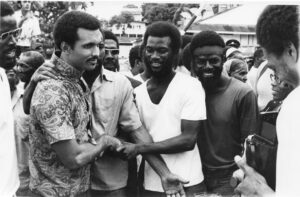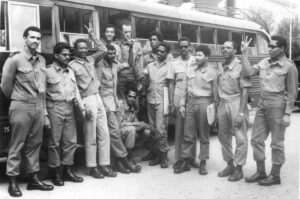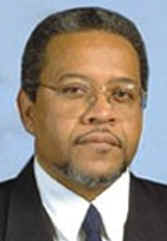Reading Time 4 mins
February 26, 2023
“[I]t was the soldering officers led by Rex Lassalle and Raffique Shah who impressed me the most and a source from which I later drew the courage to take on the powers that be in the fight for progress, justice, and equality.”
The explosion of mass protests in T&T in Feb 1970 was precipitated by the violent arrest and expulsion of West Indians at Sir George Williams University in Canada, the Walter Rodney riots in Jamaica, the anti-colonial liberation struggles raging across Africa, Indo-China and Latin America, the Civil Rights Movement in the U.S. and were also immediately preceded by fierce local struggles such as the heroic Bus.

All of the students in the form five class of Woodbrook Secondary School were suspended in 1970
Workers Strike in 1969 and over innumerable incidents of racist degradation against Afro and Indo Trinbagonians such as banking institutions and the infamous Country Club Affair – which all formed the setting for the February Uprising, the declaration of a State of Emergency, and the April mutiny in the Army.
Interestingly, the label “Black Power” was attached to the protests by the country’s newspapers following protesters’ entry, on February 26, 1970, into the Catholic Cathedral and the Canadian banking institutions as symbols of racism and continued colonial exploitation despite formal Independence since 1962. It was a creature and characterization created and imposed by the media houses, hardly friends of the protesters who, up to that time, had been marching and rallying under the banner and cry of “Power to the People!”
Locating Self
Rex Lassalle is a name and figure forever imprinted in my mind since I was a first-form high-school student at C.I.C. (the College of the Immaculate Conception) in 1970 in Trinidad & Tobago. The 1970′ February Revolution’ (to mark the February protests) or ‘Black Power’ Uprising in T&T became and remained the single-most impactful development in that nation’s history since becoming independent in 1962. For instance, it directly forced the nationalization of critical sections of the national economy.

Soldiers greeted Lassalle on his release from prison on July 27, 1972.
Rex Lassalle was one of three, Sandhurst-trained military officers jailed and put on trial before a military tribunal (drawn from foreign military commanders) for leading an army mutiny in T&T in April 1970, 53 years ago. Given the orders to move an army platoon into Port of Spain, unquestionably to help suppress the peaceful mass protests across the country, Rex Lasalle, Raffique Shah, and Michael Bazzie chose to lead a mutiny instead. They were followed by a majority of the country’s soldiers and munitions.
Eighty-three soldiers were charged. Out of the 1971 trial, stiff prison sentences were issued. Raffique Shah was sentenced to 20 years, Rex Lassalle to 15, and Michael Bazie to seven.

Soldiers outside the Town Hall (P.O.S.) where the CM was held. P.O. indicates the soldier passed on. From left, Lts. R. Lassalle and R. Shah, Privates Ferguson Guy p.o., George Pran p.o., L/Cpl Carl Lai Leung, Pts Malcolm Parkinson p.o., Maurice Noray stooping with shades p.o., Charles Marcano p.o., Cpl Cecil Etienne p.o, Lt. Mike Bazie, Pts Winston Bacchus p.o., Ivan King, Lennox Crowe
All of the sentences were overturned in 1972. But the mutiny, the trial, and the jailing of these young patriotic officers transfixed the nation for the better part of two years. It sparked “Free Our Soldiers!” mass protests supported by large sections of the population, especially gripping the nation’s secondary school students.
The 1970 army mutiny capped weeks of demonstrations. It led to the declaration of a State of Emergency by the Eric Williams government, which was already headed in that direction, given the orders to move soldiers into the capital. Those events, the court trials, the repression and protests that followed (even though I had already joined the striking Bata workers’ picket lines and also gone down to see the Bus worker’s strike lines, both in 1969) shaped the generation of Trinbagonians who either lived or followed it, but unbeknownst to whom, history was being forged.
So much so that when I later led New York City Transit workers in the Strike that shut down that entire city in 2005, 35 years later, I maintained an abiding sense that 1970 and its aftermath in T&T had played the most significant part in preparing me for effectively taking on N.Y.’s billionaire mayor (Bloomberg) and Governor (George Pataki) who was actively exploring a run at the presidency of the United States. The Strike destroyed his hopes of becoming the next U.S. president.
Among the figures who rose to leadership roles in the tumultuous 1970 protest in T&T, it was the soldering officers led by Rex Lassalle and Raffique Shah who impressed me the most and the source from which I later drew the courage to take on the powers that be in the fight for progress, justice, and equality. The disciplined defiance shown by the soldiers was refreshing at a time when indiscipline and lumpen behavior were sometimes used to confuse and misdirect youth. So, it was an absolute honor and pleasure to sit at the feet of the Lieutenant as he engaged with my brother and friend of many decades, Winthrop Holder, and me in phone and Internet chats to share his story.
Click here for “In Conversation With Rex Lassalle On 1970 And Beyond.”
 Roger Toussaint, President of TWU Local 100 of New York, 2001-09
Roger Toussaint, President of TWU Local 100 of New York, 2001-09

 Roger Toussaint, President of TWU Local 100 of New York, 2001-09
Roger Toussaint, President of TWU Local 100 of New York, 2001-09


It looks like there is at long last a glimmer of hope for our final emancipation from mental slavery. Let’s keep a close eye on the Ukraine conflict. And I have a book that might help: Ian Isidore Smart, WHAT IS UKRAINE TO ME? Washington DC: Original World Press, 2022.
owpconnections@gmail.com
Indelible memories-yes a period that has defined most of us whether we recognize it or not
The fire that was lit in Roger Toussaint’s spirit like mine, in that revolutionary era is still there. How can it not be when it was true to the cause. I saw it aflame in 2005 in New York and knew that he was unstoppable. Those brothers LaSalle and Shah chose to surrender rather than create a carnage. Their message was heard.